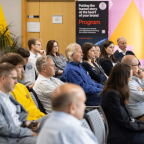
Robert Hillier: Give kids the tech tools to succeed
The national curriculum is letting my children down. They can write a sentence in hieroglyphics, but can’t set up a zoom call. They can tell me the Earth spins on an invisible axis but not what 5G is. I’m not decrying a polymathic education – I appreciate knowledge of history and geography is vital to an appreciation of the universe.
The national curriculum came in to being with the 1988 Education Act. Its aim was to
“…provide pupils with an introduction to the essential knowledge they require to be educated citizens.” It was brought in with large cross-party support and with good intention – to standardise local variations. It seems as if the year of the Sony Discman and Crocodile Dundee II on VHS has set the agenda for the next 35 years. I am shocked at how little lessons have changed since my own school days.
When my children enter the workforce in 10 years’ time they’ll be expected to work in teams (or Teams) and understand creative and design processes. They probably won’t have a single career, but will have to manage portfolio working, handle data and analyse and present complex information.
In Denmark, which has the highest level of social mobility in the world, there is a constructive use of iPads from pre-school on. Media literacy classes are seen as a fundamental skill for 21st century learners and it’s integrated in the Danish curriculum - encompassing 21st century skills, digital work ethics and digital literacy.
All students bring their own devices to school, and especially at high school level it is unthinkable for a student to come to school without their laptop.
In South Korea (you know, the country with a working test and trace system) five-year olds build robots from scratch. Children can be as creative with technology as they can with words and pictures. Sucking the life out of joyful subjects so they can be tested (and traced) is impacting on children’s ability to see technology as a creative tool that’s part of their lives.
This is part of the joy of learning and interacting with technology. They may not, as yet, know how it works, but they are learning as they go and are excited by its possibilities.
Six- and seven-year-olds are now expected to know prepositions, conjunctions and subordinate clauses; eight- and nine-year-olds, noun phrases expanded by the addition of modifying adjectives, preposition phrases, fronted adverbials and determiners; nine- and 10-year-olds, modal verbs and relative pronoun cohesion.
As linguists Noam Chomsky and Steven Pinker have shown, children deploy grammar instinctively; they don’t use it as building blocks to construct sentences. Our teaching of tech should be the same – providing the tools to explore its power and potential.
An old-fashioned reaction against “screen-time” reminds me of being told by elderly relatives that I’d get square eyes from watching “the box” as a child, reflecting the radio-phobia movement of the 1920s. Don’t watch Planet Earth in case you catch a glimpse of the Real Housewives of Cheshire.
If home-schooling has taught me anything in the past year, it’s to take more notice of the day-to-day disconnect between the world my children live in and the tasks they are asked to undertake. As Mark Twain said “don’t let school get in the way of your education”.
Robert Hillier is a journalist and communications consultant who co-presents the Tribe Tech podcast. During 20 years in journalism, he has worked for the BBC, CNN and Sky.







